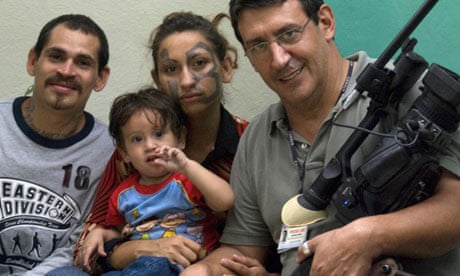A court in El Salvador has convicted 10 gang members and a former policeman over the murder of a Franco-Spanish photojournalist who made an internationally acclaimed documentary about them.
Christian Poveda initially gained the trust of a notorious gang known as Mara 18 in La Campanera, a tough slum in the capital, San Salvador, but in September 2009 was ambushed and shot four times in the head.
The central American country has one of the world's highest homicide rates.
This week a court sentenced Luis Vásquez and José Alejandro Melara to 30 years for planning the murder and two others to 20 years for pulling the trigger and acting as lookout.
A former policeman, Juan Napoleón Espinoza, was jailed for four years as an accessory for telling the gang that Poveda was an informer.
Other officers denied their colleague's claim, which was thought to have turned the gang against Poveda.
The other gang members were given four years for covering up the crime.
It was also suggested some members were unhappy over their depiction in La Vida Loca (The Crazy Life), which was released to glowing international reviews a few months before his murder. Poveda apparently told the gang it would not be screened in El Salvador but pirated DVD copies found their way into the country.
Poveda, 53, who covered wars in Iran, Iraq and Lebanon, had got to know his Salvadorean subjects intimately, practically living with them to capture their initiations, tattoo sessions, drug taking, killings and funerals. "The gangs are fed up with journalists who come, stay for two hours, look for spectacular images and leave," he once told the BBC.
He was killed in the village of El Rosario on his way to arrange an interview with female gang members for journalists from a French fashion magazine.
Reporters Without Borders said the special court appeared to have established the sequence of events and immediate motive but did not reconstruct the entire story of Poveda's relationship with the gang.
Testimony and local media reports from the two-day trial – whose first day was closed to journalists – should be treated with scepticism, said the watchdog.
"We greet this verdict with a mixture of relief and frustration. It marks a victory in the fight against impunity but as an attempt to establish the truth, it may have been too hasty."
